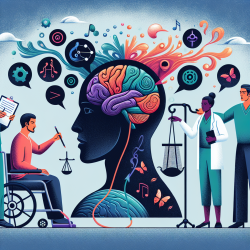Unlocking the Potential: Therapy for Right Hemisphere Damage
As a speech-language pathologist, understanding the nuances of communication disorders following right hemisphere damage (RHD) is crucial for effective intervention. The research article "Clinical Focus on Prosodic, Discursive and Pragmatic Treatment for Right Hemisphere Damaged Adults: What's Right?" provides a comprehensive review of the current state of research and offers practical guidelines for clinicians.
Understanding the Challenges
RHD can significantly affect communication, with estimates suggesting that 50% to 78% of individuals with RHD experience impairments in prosody, discourse, semantics, and pragmatics. These deficits can lead to inadequate social interactions, highlighting the need for targeted intervention strategies.
Key Components of Communication Affected by RHD
- Prosody: Individuals may exhibit monotonous speech, lack facial expressions, or have an atypical speech rate. Treatment approaches like motor-imitative exercises and visual feedback have shown promise in improving prosody.
- Discourse: RHD can result in less informative narrative discourse and difficulties in conversational exchanges. Encouraging discourse production through structured stimuli and feedback can enhance narrative skills.
- Pragmatics: Challenges include a preference for literal meanings and difficulties with indirect requests. Combining applied behavior analysis and positive behavior supports in therapy can improve pragmatic skills.
Implementing Effective Interventions
To enhance therapeutic outcomes, clinicians should consider the following guidelines:
- Raise Awareness: Help individuals recognize their deficits through recorded sequences and real-life examples.
- Organize into a Hierarchy: Present activities and stimuli in increasing difficulty to challenge and improve communication skills.
- Consider Cognitive Impairments: Tailor interventions to address cognitive deficits, such as memory and attention, that may impact communication.
Future Directions for Research
There is a pressing need for studies with robust methodologies to validate and refine intervention strategies. Future research should focus on:
- Comparing communication deficits across different etiologies to develop universal intervention strategies.
- Exploring partner-based interventions to enhance communication in natural settings.
- Investigating the role of lexico-semantics in communication deficits and its potential for targeted therapy.
By integrating these insights into clinical practice, speech-language pathologists can significantly improve the communication outcomes for individuals with RHD. To delve deeper into the research, you can access the original article Clinical Focus on Prosodic, Discursive and Pragmatic Treatment for Right Hemisphere Damaged Adults: What's Right?.










